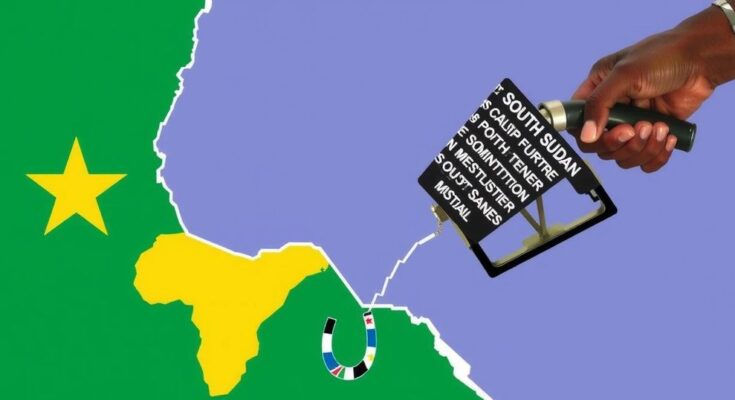The South Sudan Revenue Authority has suspended a controversial fuel levy on petroleum products entering Juba from Kenya after receiving complaints from businesses and NGOs. The levy had sparked criticism for being illegal and contributing to high fuel prices, impacting humanitarian supply chains. The SSRA has requested the removal of related charges, stating that the government will cover service costs, signaling a potential easing of economic pressures in the region.
The South Sudan Revenue Authority (SSRA) has decided to suspend a contentious levy applied to petroleum products entering Juba from Kenya, a mere seven months after its initiation. This suspension follows numerous complaints from various businesses and non-governmental organizations regarding the levy, which they argue is both unlawful and exacerbates the financial struggles of South Sudan’s economy. The implementation of the E-petroleum Accreditation Permit fee, which commenced in March 2024, led to widespread dissent among stakeholders, including transporters, fuel importers, and international aid groups. There are grave concerns that the increased fuel prices resulting from such levies could jeopardize vital humanitarian supply chains into South Sudan. The levy, which amounted to $0.03 per liter for the E-petroleum Accreditation Permit and an additional $0.024 per liter for fuel marking, cumulatively imposed significant financial strain, amounting to $1,944 for a fuel truck carrying 36,000 liters. The SSRA, recognizing these burdens, formally requested the Ministry of Information, Communication, Technology & Postal Services to annul all associated charges, emphasizing the negative repercussions these fees were having on commodity prices in the market. Furthermore, SSRA Commissioner for Corporate Services, Daniel Kon Ater, proclaimed that the South Sudanese government would assume responsibility for the costs of the service in adherence to an agreement established in March 2024. The intricate backdrop to this situation involves Crawford Capital International Ltd and its subsidiary, Capital Pay Ltd, which were tasked with collecting the levy at various Kenyan exit points. The firms, comprising both Kenyan and South Sudanese stakeholders, have faced allegations of imposing exorbitant fees on importers, thereby exacerbating the financial burden of obtaining the necessary certification to export fuel into South Sudan. Although the High Court previously denied a stay on the levy in early May, the recent decision by the SSRA to suspend the charges indicates a significant shift in policy which stakeholders hope will alleviate some economic pressure.
The E-petroleum Accreditation Permit levy, which was introduced as a financial mechanism to support the collection of taxes for petroleum imported into South Sudan, faced immediate backlash. Stakeholders felt that the fee was overly burdensome and illegal, particularly within the context of South Sudan’s already fragile economy. The complexities of the arrangement involved private firms collecting the levy, deepening concerns over potential exploitation by local and foreign businesses. The suspension of this levy reflects the government’s responsiveness to economic pressures exerted by both domestic and international actors.
The suspension of the E-petroleum Accreditation Permit levy by the South Sudan Revenue Authority marks a significant adjustment in policy, largely driven by pushback from various stakeholders concerned about its legal standing and financial ramifications. This decision aims to promote economic stability in South Sudan and facilitate the uninterrupted flow of essential humanitarian aid. In light of the government’s commitment to assume service costs, there is cautious optimism among stakeholders regarding improved market conditions and reduced fuel prices moving forward.
Original Source: www.theeastafrican.co.ke




